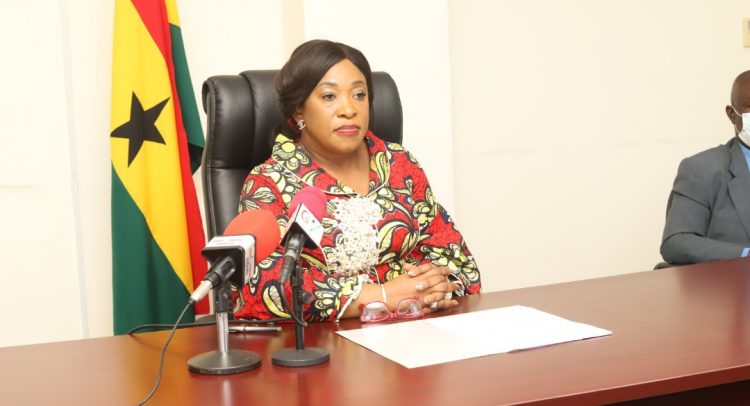Shirley Ayorkor Botchwey
Minister of Foreign Affairs and Regional Integration, Shirley Ayorkor Botchwey, has observed that the building of cooperation and partnerships is key to addressing the impact of coronavirus on women and girls globally.
She made the call in a speech at the Israel Agency for International Development Cooperation (MASHAV’s) international women leaders e-conference on the impact of social and economic impact of coronavirus on women and girls.
The conference was held on 27th and 28th July 2020.
Speaking under the theme: “Building Resilience through Cooperation and Partnerships”, says most issues concerning women and girls are deeply rooted in societal norms, values and belief systems.
Thus, she emphasized that “building cooperation and partnerships at all these levels is critical to addressing the impact of the COVID-19 pandemic on women and girls.”
She said as various countries battle with the effect of the pandemic and try to identify measures of curbing its impact on citizens, the partnerships and collaborations cannot be limited to only the national and regional levels.
Ultimately, she pointed out, the aim of the global community is to develop a vaccine against the virus.
Individual countries and relevant international organisations have therefore stepped up their research capabilities with the view to coming up with these vaccines, she said.
“Collaboration at this level is just as critical as collaboration at the national and regional levels if we are to avoid duplication of efforts whilst ensuring speed and efficiency by our research institutions.”
She urged that “Our partnerships and cooperation at these levels must therefore focus on:
• The development of vaccines and cure for the virus;
• Accessibility of the vaccines by all;
• Identifying and supporting initiatives undertaken by developing countries to support vulnerable groups, such as women and children, during the pandemic;
• The accessibility of financial packages and credit facilities for developing countries to help rejuvenate their economies; and
• Investments in critical sectors, such as science and technology and support for basic and applied research to strengthen the capacities of national and international institutions to deal with future epidemics.”
For me, therefore, building resilience through partnerships and cooperation during this COVID-19 pandemic must happen at different levels: Community, National, Regional, Continental, Global levels. At all these levels, it is important for Governments to be clear about what they want to achieve, and to put in place the right strategies to achieve them, bearing in mind the need to protect the poor and vulnerable, the Minister said.
According to her, reactions of various governments to the pandemic have had unintended negative consequences on many people especially in developing countries.
She indicated that “in most cases, women are the most affected, as some have lost their means of income, particularly self-employed artisanal workers, cross border and petty traders.”
“This is inadvertently, putting untold stress and hardship on households”, she added.
“It is therefore important for Governments to continue to build the resilience of their people, institutions and systems to withstand challenges such as the COVID-19 pandemic. It is even more critical to do so for the under-privileged in our societies who usually feel the most burden of disasters such as these.”
She shared with the panel, Ghana, West Africa and indeed Africa’s experience in handling the pandemic.
“Here in Ghana, issues of women and the girl-child remain critical to Government, and the Ministry of Gender, Children and Social Protection has been partnering other institutions to provide bi-monthly cash grants for the vulnerable under the Livelihood Empowerment Against Poverty programme; distributing hand sanitizers and other products to female head porters and identified vulnerable groups; and providing hot meals to vulnerable people,” she said.
” Government is also absorbing the full cost of utilities of low-income consumers during this pandemic.”
She observed that
within the ECOWAS region, member states are collaborating in the fight against the pandemic. Regional leaders in April 2020, held a virtual extraordinary summit on the COVID-19 pandemic, during which they agreed on measures to be taken to address the crisis.
At that meeting, she recounted, they instructed the West Africa Health Organisation (WAHO) to continue its efforts of regional coordination, collaboration and communication, particularly through the strengthening of networks of national public health institutes and laboratories.
” In addition to training health workers of member states, WAHO is providing critical medical equipment to member states in the form of surgical masks, diagnostic test kits, ventilators and ventilator trolleys, and sanitizers.”
At the Continental level, she said the African Union, recognizing the importance of cooperation and partnership, held a virtual session of Heads of State and Government and pledged an amount of $4.5 million towards strengthening the capacity of the Centre for Disease Control and Prevention in the fight against the virus within the continent.
“The member states of the African Union at the meeting agreed to establish the African Covid-19 Fund to which member states initially contributed $12.5 million as seed funding.”
Impact
She underscored the adverse impact of coronavirus on humanity.
“The COVID 19 pandemic has shaken the core of human existence. Many countries have found themselves running after the pandemic instead of having a strategy to face it head-on.”
” The interventions outlined above highlight some of the interventions of the Government of Ghana, which inure to the benefit of vulnerable members of our society, particularly women and girls.”
She stated that the Government of Ghana remains committed to working with the rest of world to bring this pandemic to an end and to reduce its impact on the vulnerable in society.
” It is our hope that this conference will bear the fruits of highlighting pertinent solutions to the social and economic challenges encountered by women and girls during these difficult times.”
By Melvin Tarlue


